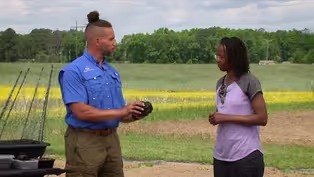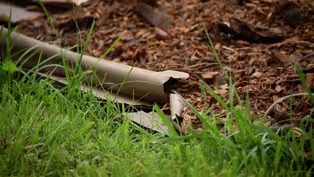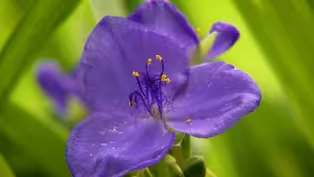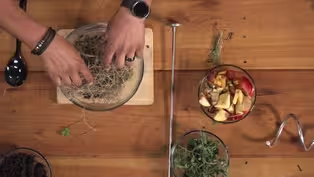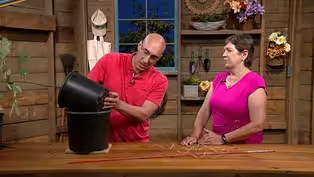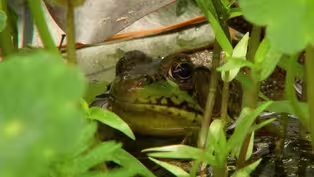Virginia Home Grown
Improving garden soil
Clip: Season 24 Episode 3 | 3m 23sVideo has Closed Captions
Maintain soft and fertile soil in raised bed gardens
Dr. Robyn Puffenbarger shares tips for maintaining soil in raised beds by avoiding compaction and preventing weeds by keeping the soil covered with organic material. Featured on VHG episode 2403; May 2024.
Problems playing video? | Closed Captioning Feedback
Problems playing video? | Closed Captioning Feedback
Virginia Home Grown is a local public television program presented by VPM
Virginia Home Grown
Improving garden soil
Clip: Season 24 Episode 3 | 3m 23sVideo has Closed Captions
Dr. Robyn Puffenbarger shares tips for maintaining soil in raised beds by avoiding compaction and preventing weeds by keeping the soil covered with organic material. Featured on VHG episode 2403; May 2024.
Problems playing video? | Closed Captioning Feedback
How to Watch Virginia Home Grown
Virginia Home Grown is available to stream on pbs.org and the free PBS App, available on iPhone, Apple TV, Android TV, Android smartphones, Amazon Fire TV, Amazon Fire Tablet, Roku, Samsung Smart TV, and Vizio.
Providing Support for PBS.org
Learn Moreabout PBS online sponsorship(playful music) >>The big three when you're thinking about gardening, are sun, water, and soil.
And the one you probably have the most control over is your soil.
Thinking about where you want your garden and what kind of substrate you have to grow your plants in is really important for successful plant growth.
Here in my garden, where I'm doing my vegetable, herbs, and flowers, one of the things I was really thinking about is how I don't want to compact the soil.
Once we've fluffed the soil a bit, and added some amendments, we don't wanna walk on it anymore.
So one of the things that we've done is put in permanent paths with mulch, and then I can just walk, or use my heavy-duty wheelbarrow anytime I want, and not worry about compacting the soil where I want my plants.
The next thing I thought about was how to keep weeds from growing.
And one of the big things I do is put on lots of leaves, or grass clippings, whatever I've got on hand.
That makes a layer that the weeds cannot either germinate or get through.
And you can see here where I've got leaves, there's no green growth.
And as we move away to the side, where the material has degraded over the fall to now this spring, you can see there's some little weeds starting to come in.
Another thing that adding compost and organic material, like this mulch, helps with is the soil moisture.
So as I start to pull the leaves away, you can see the darkness, you can feel the dampness of this soil compared to the soil here, which has been exposed to the sun, and is beginning to dry out.
Depending on what you're planting, you may have to pull the leaves completely away, because you are using little tiny seeds that will need the sunlight to germinate.
But I'm about to plant tomatoes in this bed, so I'll be able to leave this mulch all around the plants.
One of the things that I find really important is doing a soil test.
That helps me know what the soil micronutrients are like, and what the pH is like.
For this kind of garden bed I have here, just a regular neutral pH is important.
Another thing I like having is a little pocket soil thermometer.
That tells me the right temperature.
I'm here in the Shenandoah Valley, and it's just starting to warm up enough, and my soil thermometer is reading 60 degrees.
That means it's time for me to start planting my tomatoes in this bed, but it's not 70 yet, so it's not time for okra.
So one of the things, by not walking on my soil, by not compacting it, I can easily slide my soil knife right in when I'm ready to plant my plants, and just pop the soil right up.
Oh, and here's some earthworms, so they're eating the organic material, and providing their castings as extra fertilizer.
I've got some chunks of clay mixed in with my better soil that has some organic material, so I've got a nice soil bed ready to go.
Adding compost, adding organic material, and using chemicals only when necessary will help you have healthy soil, healthy plants, and a wonderful garden.
Have fun out there planting your plants.
Video has Closed Captions
Clip: S24 Ep3 | 8m 40s | Learn about a amendment made with activated charcoal to improve soil health and structure (8m 40s)
Cardboard for suppressing weeds
Video has Closed Captions
Clip: S24 Ep3 | 2m 48s | Create a weed barrier in your garden by reusing cardboard packaging (2m 48s)
Video has Closed Captions
Clip: S24 Ep3 | 26m 46s | Healthy gardens are more than plants! (26m 46s)
Video has Closed Captions
Clip: S24 Ep3 | 6m 42s | How to make your own compost at home (6m 42s)
Video has Closed Captions
Clip: S24 Ep3 | 6m 18s | How to pot up a young tree and encourage vertical growth (6m 18s)
Transforming a traditional landscape
Video has Closed Captions
Clip: S24 Ep3 | 7m 53s | Adding native plants, reducing runoff, and improving soil creates an eco-friendly garden (7m 53s)
Providing Support for PBS.org
Learn Moreabout PBS online sponsorship

- Home and How To

Hit the road in a classic car for a tour through Great Britain with two antiques experts.












Support for PBS provided by:
Virginia Home Grown is a local public television program presented by VPM
